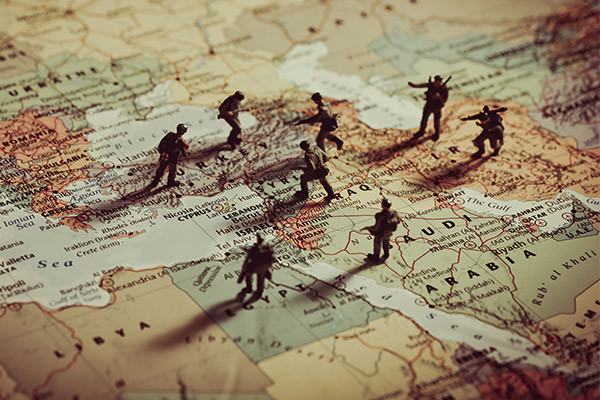Middle East Security under President Trump: Developing Agenda
This article looks at how a second Trump term might affect the Middle East, especially in light of the Gaza war, tensions with Iran, and global economic shifts. It raises questions about whether Trump’s return would bring stability or deepen existing challenges, as countries in the region navigate changing alliances and security threats.
- by Rasha Al Joundy ,
- Monday, 14th April, 2025
Given the strong relationships between President Trump and several Middle Eastern leaders since his first term in office, many anticipated a period of peace and prosperity in the region during his presidency. Some were even optimistic about a shift away from President Biden’s policies, especially regarding the Gaza war. However, several key issues will determine whether a second Trump term truly benefits the Middle East or It will be a continuation of difficult security calculations.
1. The Gaza War and Regional Stability
The Gaza war remains one of the region’s most pressing and costly challenges—politically, economically, and socially. While Gulf Cooperation Council (GCC) countries often bear much of the political and financial burden, neighboring states face the direct consequences of regional instability.
Egypt, for example, is grappling with what appears to be an expansionist Israeli policy in Gaza, which threatens the foundation of Camp David Accords. Meanwhile, Jordan faces an existential risk if the West Bank collapses under similar Israeli actions, particularly those seen as pushing for the displacement of Palestinians. President Trump has previously mentioned concepts like the “Gaza Riviera,” hinting at potential real estate-driven visions for the region, which raise concerns among Arab nations.
Arab countries strongly oppose any displacement policy that would move Palestinians into neighboring states, as such actions could trigger long-term instability and conflict. These nations understand that forcibly relocating people from their homeland creates a legacy of injustice and resistance. Instead, they have proposed alternative strategies to maintain peace between Israel and its neighbors—strategies that could pave the way for future peace agreements with countries like Saudi Arabia, Lebanon, and even Syria.
However, rather than pursue regional stability through diplomacy, Israel under Prime Minister Netanyahu has adopted a tactical approach—frequently targeting Syrian territory—further escalating tensions. This has frustrated those in the Arab world who hoped for new and constructive Israeli relations with Syria and a broader strategic roadmap to peace.
2. Economic Policy and Global Uncertainty
President Trump's relatively low tariffs on many countries in the region, especially when compared to other close U.S. allies, could be viewed positively. However, broader uncertainty in the global economy presents significant risks for Middle Eastern nations, particularly those dependent on energy exports. Any disruption in the supply chain could affect market stability, consumer behavior, and pricing. For GCC countries pursuing economic diversification and aiming to create new opportunities for their populations, this economic turbulence could threaten the progress of such initiatives.
The evolving trade relationship between the U.S. and China is of particular concern. A full-blown trade war between the world’s two largest economies would inevitably have ripple effects across the global economy. If the U.S. were to pressure its allies to decouple economically from China, such a move would not only be economically challenging but politically charged. This shift could mark the end of the current era of globalization, ushering in a new phase of economic tension—what some are calling an “economic cold war” between the global north and south. This economic crisis on a global scale could manifest as a security dilemma to the Middle East, and as a step backward to political and economic progress among its countries.
Third, the negotiations with Iran over its nuclear program present both an opportunity and a threat—an opportunity if it succeeded, and a threat if it reached a deadlock. When President Obama signed the JCPOA with Iran, the security concerns of regional countries were largely ignored. Iran took advantage of the deal, using both the funds and the international legitimacy it gained to empower its proxies, posing direct security threats to Middle Eastern countries and U.S. allies in the Gulf Cooperation Council (GCC).
Today, President Trump benefits from Iran's weakened influence in the region. This shift came after the fall of Bashar al-Assad in Syria and the deaths of key Hezbollah leaders in Lebanon, including Hassan Nasrallah, which significantly diminished Iran's sway in that country. Currently, Iran's remaining active proxies are the Houthis in Yemen and the Popular Mobilization Forces (Hashed al-Shaabi) in Iraq. Unlike President Obama, who seemed willing to hand over regional influence to Iran regardless of the consequences for U.S. allies—including Israel—President Trump appears determined to achieve both goals: curbing Iran’s nuclear ambitions and dismantling its military influence, which has destabilized the region for decades.
Arab countries would undoubtedly welcome a comprehensive and fair deal with Iran—one that opens a new chapter in regional relations, supports Iran's economic growth, and encourages a shift in regional priorities toward prosperity and development after years of focusing resources on addressing external threats. At the same time, the region is cautiously awaiting the outcome of the latest round of U.S.-Iran negotiations in Oman. President Trump seems genuinely committed to securing a deal, which suggests two things: first, he is likely to resist any Iranian attempts to delay negotiations—a well-known Iranian tactic—and second, Iran stands to gain significantly if it negotiates in good faith and recognizes that the opportunities available today may not exist in future negotiations. President Trump's urgency to reach a deal could present Iran with a valuable, time-sensitive opportunity. Additionally, Iran should clearly articulate both its demands and its red lines—such as its firm rejection of a "Libyan-style" disarmament. Such clarity would help ease tensions with the U.S. and potentially pave the way for a deal that brings greater peace and prosperity to the region.
The Middle East is at a crossroads. Every country is seeking to define its role amid shifting dynamics. The landscape has changed dramatically with President Trump in the White House, the fall of Assad in Syria, the formation of a Lebanese government independent of Hezbollah, the beginning of U.S.-Russia-Ukraine talks, and renewed U.S.-Iran dialogue. Turkey and Israel are also preparing for pivotal negotiations mediated by President Trump. All key players in the region are undergoing transformations, which could either contribute to long-term stability or plunge the region into yet another cycle of prolonged instability.

Rasha Al Joundy
Research Supervisor
Read More
Areas of Expertise
- Expert in the Gulf region politics,
- Security and internal affairs and has been working on the GCC region since 2011.
Education
- Master’s degree in International Relations and World Order at Leicester University (UK 2016).
- Graduated from the Faculty of Law – University of Damascus in Syria in 2006
Bio
completed her master’s degree in International Relations and World Order at Leicester University (UK 2016). She graduated from the Faculty of Law – University of Damascus in Syria in 2006, and trained as a lawyer to register at Damascus bar association. She is an expert in the Gulf region politics, security and internal affairs and has been working on this region since 2011. Rasha Currently work as a senior researcher for Gulf affairs and supervise the training program at Dubai Pubic Policy Research Centre.

